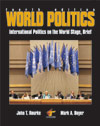 |  World Politics: International Politics on the World Stage, Brief, 4/e John T. Rourke,
University of Connecticut - Storrs
Mark A. Boyer,
University of Connecticut - Storrs
Pursuing Security
The U.N. Charter and International SecurityThe fundamental idea of international security is contained
in the UN Charter. Article 1 commits all members "to maintain
international peace and security, and to that end, to take effective
collective measures" to preserve or restore the peace. Article
24 gives to the Security Council the "primary responsibility for
the maintenance of international peace and security," and by Article
25 members "agree to accept and carry out the decisions" of
the council. Article 42 gives the Security Council the authority to
"take such action by air, sea, or land forces as may be necessary
to maintain or restore international peace and security." Key
language in Article 43 requires members to "undertake to make
available to the Security Council, on its call... armed forces...
necessary for the purposes" of peace maintenance. The forces are
subject to "special agreements" between the UN and member
countries, but the article (as written in 1945) states that the "agreements
shall be negotiated as soon as possible." If you think about the
implications of this language, clauses to which virtually all countries
are bound legally, it is very powerful. |
|



 2002 McGraw-Hill Higher Education
2002 McGraw-Hill Higher Education